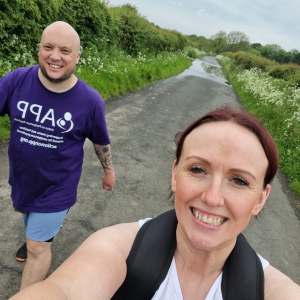
A former patient has walked 27 miles to raise money for a charity supporting mothers and families affected by postpartum psychosis.
Last week, Kayleigh Avery, 38, walked from her home in Sunderland to Beadnell Mother and Baby Unit at St George’s Park in Morpeth to raise money and awareness for Action on Postpartum Psychosis.
The walk represents the journey Kayleigh’s family made every day when she was an inpatient on the unit.
Kayleigh suffered from postpartum psychosis in 2014 after she had her first daughter, Daisy.
“It came out of the blue,” she explained. “I’d never had any mental health issues before.”
Kayleigh recalls leaving the hospital after giving birth.
“When I left hospital, things started to feel different. I lost touch with reality and was having hallucinations. I thought people were doing things they weren’t.
“I thought I had died during childbirth and that I was going to hell. It was really scary for me and my family.”
Luckily, Kayleigh’s husband and midwife quickly realised something was wrong and she was able to get the help she needed.
Kayleigh was taken to Beadnell Mother and Baby Unit, where she stayed for six weeks. Part of Cumbria, Northumberland, Tyne and Wear NHS Foundation Trust (CNTW), Beadnell supports women experiencing severe mental illness in pregnancy and following birth, with specialist support available to treat conditions such as severe postnatal depression and postpartum psychosis.
“The staff and nurses there are amazing at what they do,” Kayleigh said.
“At the time I thought, ‘this is my life now, I’m never going to get better’. It can be quite a long road to recovery but with the help of staff on the ward, you do get better.”
Kayleigh’s family were able to visit regularly and the ward has overnight facilities for partners to stay.
“At Beadnell, they work to help you bond with your baby,” Kayleigh added.
“If I had been in a general psychiatric ward, I wouldn’t have had my baby with me but in a mother and baby unit, you can. Being separated from my child would have been detrimental to my mental health.
“The ward becomes a safe space. It doesn’t feel like a hospital, it’s like a little home.”
When Kayleigh was discharged, she was on medication for two years. She came off the medication when her and her husband decided to have another baby.
“Consultants said there was a chance I could get postpartum psychosis again,” Kayleigh added.
“Unfortunately, when I had my second daughter Jasmine, it did happen again.”
Kayleigh was readmitted to Beadnell in 2018, where she spent another six weeks.
Her daughters are now nine and five and Kayleigh says she will be on medication for the rest of her life.
“If it helps me to be the mam I want to be, then I will keep taking it,” she said.
On Sunday 26 May, Kayleigh and her husband Dave left their home at 5.40am and arrived at St George’s Park at 4.10pm, 27 miles and 10 and a half hours later.
They were joined at the end by their two daughters and family members cheering them on.
On finishing the walk, Kayleigh said: “The last few miles were tough, but we made it and feel really proud of ourselves!”
Every year, Action on Postpartum Psychosis holds its Miles for Mums and Babies Challenge where fundraisers are encouraged to walk, run, swim or cycle in aid of the charity.
The charity works to promote greater awareness of the condition and campaigns for improved perinatal mental health services.
Kayleigh said: “There are 19 mother and baby units in England and most only have six beds. If there wasn’t a bed for me in Morpeth, I could have been put anywhere in the country which would have been even harder for my family.
“Action for Postpartum Psychosis makes sure women receive the care and treatment they need, as well as raising awareness. Postpartum psychosis is still quite unknown. People have heard of postnatal depression, but this is on another level. It’s a medical emergency and it can happen to anyone.”
Go to Kayleigh’s JustGiving page if you’d like to donate.
Postpartum psychosis is a severe but treatable mental illness. It begins suddenly in the days and weeks after having a baby. Symptoms can include hallucinations and delusions, often with mania, depression or confusion. Find out more about the condition.
If you are pregnant or a new mother and are worried about your mental health, please speak to your GP who will help you to access the support you need.
